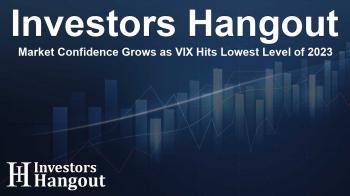Market Confidence Grows as VIX Hits Lowest Level of 2023

Market Confidence Grows as VIX Hits Lowest Level of 2023
The VIX, also known as Wall Street's "fear gauge," recently dropped by 1.07%, closing at $14.86. This marks its lowest point for the year and indicates an increasing confidence among investors, despite ongoing tariff concerns that are still in the backdrop.
Understanding the VIX and Its Implications
The VIX serves as an important measure of market volatility and investor sentiment. A decline in its value typically reflects a sense of calm in the markets. Louis Navellier, a well-respected analyst in market trends, emphasized this point, noting how current figures indicate investors are less worried about imminent threats to their investments.
Investor Sentiment Amid Tariff Discussions
Amid discussions of potential tariffs, many are wondering how this could impact overall market behavior. Navellier pointed out that even though tariffs pose a possible risk of causing market instability, the current sentiment suggests that investors are focused more on the favorable aspects of a pro-business environment.
The Broader Market Scenario
As the VIX remains below the significant $15 level, it suggests that geopolitical or trade tensions are not substantially influencing investor outlook. There appears to be a prevailing optimism regarding businesses' ability to navigate through these challenges. Such a mindset can be crucial for long-term economic stability.
Future Considerations
Looking ahead, the VIX will serve as a crucial metric for determining investor confidence and the overall stability of the market. The anticipation surrounding potential tariff implementations remains, yet industry sentiment seems prepared for these hurdles.
Continual Monitoring of Market Dynamics
As the economic landscape evolves, investors and analysts alike will need to pay close attention to the VIX as an essential indicator. While concerns could emerge regarding trade policies, the current analysis suggests that any such challenges may face difficulties in actual execution.
Conclusions on Market Resilience
The overall sentiment is clear: the market is willing to embrace a less volatile environment for now, focusing instead on the optimistic possibilities that lay ahead. This may serve as a reminder of the resilience and adaptability of market participants in the face of economic uncertainties.
Frequently Asked Questions
What does it mean when the VIX drops?
A drop in the VIX signifies lower market volatility and often indicates increased investor confidence.
How does the VIX relate to tariff concerns?
While tariffs can create uncertainty, a lower VIX suggests that investors are currently less fearful of immediate impacts from such policies.
Who is Louis Navellier?
Louis Navellier is a prominent market analyst known for his insights on stock market trends and economic factors affecting investor decisions.
What key level did the VIX close at recently?
The VIX recently closed at $14.86, marking its lowest point since the start of the year.
Why is the VIX important for investors?
The VIX serves as a gauge for market sentiment and can influence investment strategies based on perceived risks and volatility levels.
About Investors Hangout
Investors Hangout is a leading online stock forum for financial discussion and learning, offering a wide range of free tools and resources. It draws in traders of all levels, who exchange market knowledge, investigate trading tactics, and keep an eye on industry developments in real time. Featuring financial articles, stock message boards, quotes, charts, company profiles, and live news updates. Through cooperative learning and a wealth of informational resources, it helps users from novices creating their first portfolios to experts honing their techniques. Join Investors Hangout today: https://investorshangout.com/
Disclaimer: The content of this article is solely for general informational purposes only; it does not represent legal, financial, or investment advice. Investors Hangout does not offer financial advice; the author is not a licensed financial advisor. Consult a qualified advisor before making any financial or investment decisions based on this article. The author's interpretation of publicly available data presented here; as a result, they should not be taken as advice to purchase, sell, or hold any securities mentioned or any other investments. If any of the material offered here is inaccurate, please contact us for corrections.
